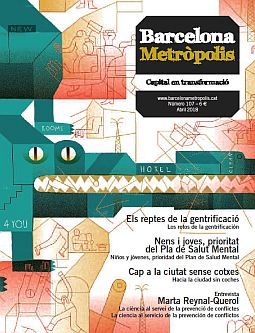In recent years, property values have climbed more than the purchasing power of the people of Barcelona faced with renting or buying accommodation. The glaring gap between valuation and prosperity can only be closed if welfare and equality are valued as social assets.
The people of Barcelona are living moments of change and confusion. The charms of the Great Enchantress, as Joan Maragall called the city, have taken off all over the world. On the world stock market of cities, Barcelona’s valuation is on the rise and foreign population from all levels of society is being drawn to the city, from the humblest immigrant to highly qualified professionals who find good jobs and an attractive lifestyle here. We can say without fear of being conceited that foreigners no longer come just for the good weather, they also come because they find a lot of other incentives and benefits associated with living here. It isn’t the warmth of the sun, but the price of real estate that makes Barcelona attractive to the eyes of foreign investors.
A high valuation, though, doesn’t necessarily translate into prosperity. Value is measured according to the price index. Prosperity, on the other hand, is measured according to citizens’ welfare and the quality of a shared public space. In recent years, property values have climbed more than the purchasing power of the people of Barcelona faced with renting or buying accommodation. Barcelona has joined a world league of cities that have become fertile soil for big investors, but its inhabitants have had to face this gentrification with their incomes frozen.
In 1821 an epidemic of yellow fever broke out in Barcelona, a disease spread by mosquitoes which is fatal in 50% of cases. At that time the origin of the disease was a mystery and the city’s doctors were split between the ‘contagionists’, who believed it was an exotic disease transmitted by contact between humans, and the ‘anti-contagionists’, who were convinced the disease was not transmitted between humans but that it came from some microbe in the sewage. The epidemic of yellow fever in Barcelona made a great impression everywhere, because it was the largest city until then to have suffered a disease of that sort, so unfamiliar in Europe. The anti-contagionist doctors were a minority, but they persuaded the authorities to close the city gates to avoid contact with the stagnant waters of the port. The effect of this mistaken decision was lethal, because within a few days the death rate shot up even higher. Eventually the contagionists were seen to be right, as they had realised that the fever spread by contact between humans, but neither side was able to prevent the epidemic from spreading.
Similarly, we could respond to the new gold fever we are facing today either by giving in to the neoliberal paradigm and accepting that we can do nothing to halt the advance of globalisation or by armour-plating the city with walls and bylaws against speculation by big investors. The first option would lead to the gradual, definitive expulsion of the city’s middle classes. The second would not guarantee the object of prosperity either, which is to fairly redistribute wealth among citizens.
This glaring gap between valuation and prosperity can only be closed if welfare and equality are valued as social assets. For decades, Barcelona has been organised around associations that have safeguarded communal life. It has a rich network of non-governmental organisations that have guaranteed welfare services in the worst moments of the crisis. All this citizen mobilisation has not been in vain and has generated understanding between residents, dreams of emancipation and a wish for change. More than ever, Barcelona is in need of a political consensus that will help to bring together a city in which business opportunities are not measured according to their monetary profitability, but in relation to the possibilities of fomenting prosperity more horizontally and democratically.
Instead of sharing out the earnings of a few among the poor, we should foment an economy that doesn’t put productivity above all else and that values the reproductive and care work that guarantees citizens’ welfare, a welfare that must not be measured only in terms of income, but also according to its social, cultural and ecological returns.




